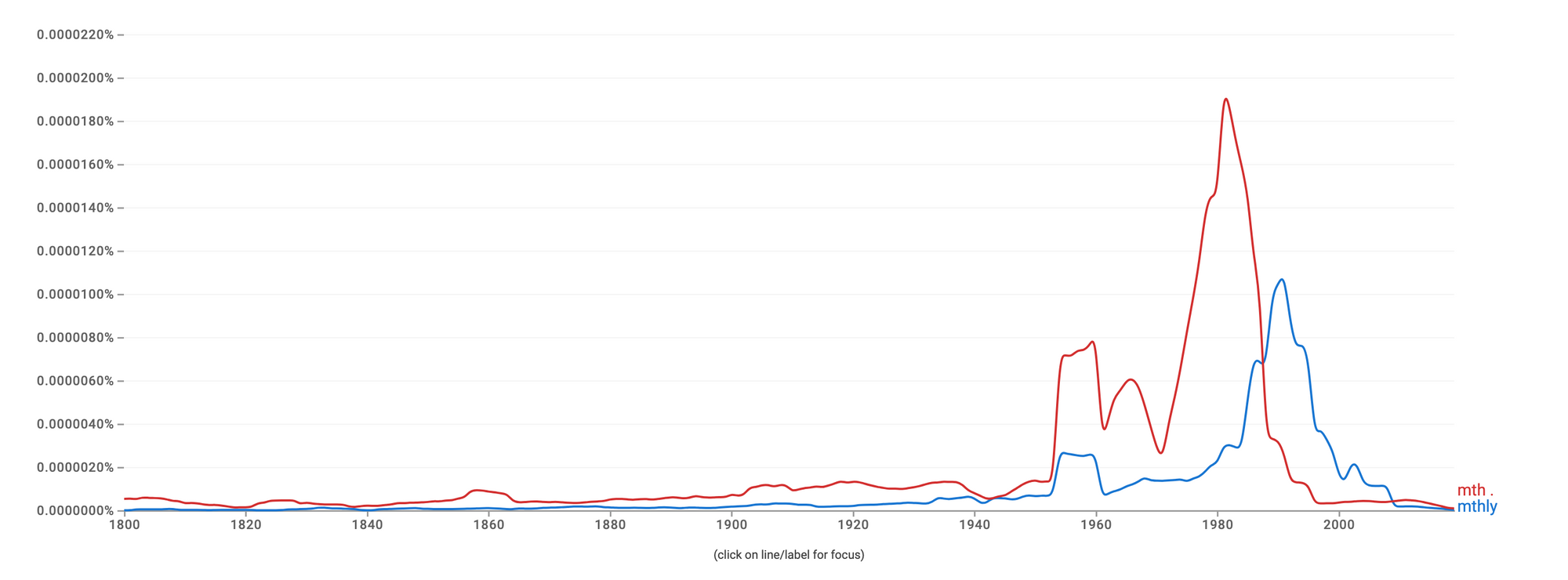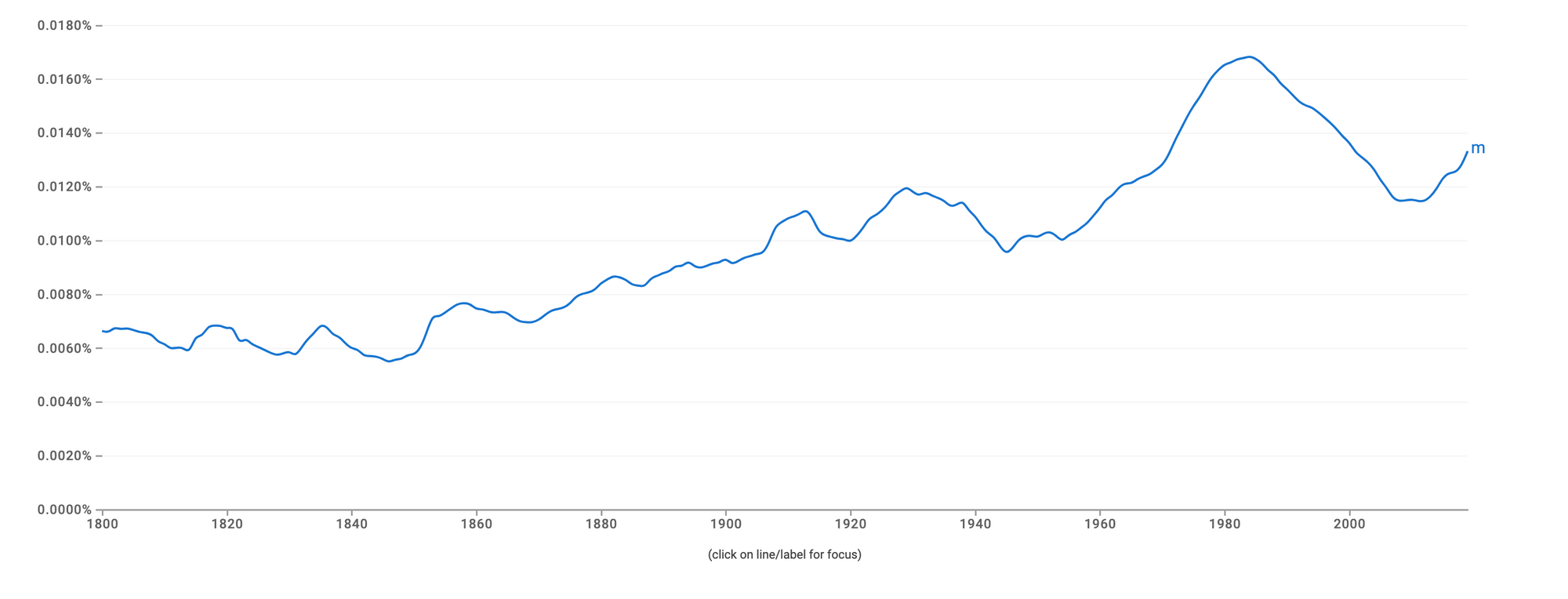- How do we abbreviate monthly? The abbreviation of monthly is "mthly," "mth.," "m."
The abbreviation of monthly has confused many people, so we have decided to take it upon ourselves to write a guide on the abbreviation of monthly. But first let's discuss some examples of when the abbreviation of monthly is used.
Examples:
- "The company provides a detailed mthly report to its stakeholders, summarizing the financial performance and key metrics on a monthly basis."
- "The subscription fee is due on the 15th of each mth., and late payments may incur additional charges."
- "The project's timeline indicates that the milestone completion is expected in m, where m represents the specific month yet to be determined."
🗓️ Occassion, Ocassion, or Occasion: Which Is Correct?
🗓️ EST vs. EDT
🗓️ Every Day vs. Everyday
What does "monthly" mean?
Before we divulge on the abbreviations of monthly, let's discuss what the word "monthly" means. "Monthly" is an adjective that refers to something occurring, produced, or calculated every month. It is often used to describe events, activities, payments, reports, or other occurrences that take place on a regular basis with a frequency of once per month. For example, monthly meetings, monthly rent payments, or monthly financial statements are events or activities that happen or are produced every month.


From the two graphs above, we can see that in recent years, the abbreviations of monthly "mthly" and "mth." has not been used as much as it has in the 1980s, "m" on the other hand has had an upward trend in use. However, we need to be mindful that the letter "m" in this instance could have been used for meanings other than the abbrevation of monthly.
Usage of the abbreviations of monthly
The most common abbreviation for "monthly" is "mth." This abbreviation is widely recognized and used in various contexts, such as financial statements, reports, and schedules. While "mthly" and "m" are occasionally used informally, "mth." is more commonly accepted and understood in professional and formal writing.
More examples of the abbreviations of monthly
"mthly":
- "The utility bills are due mthly, and residents can pay online for added convenience."
- "The company releases mthly sales reports to analyze trends and plan marketing strategies."
"mth.":
- "The conference is scheduled for the 20th of each mth., attracting professionals from various industries."
- "The financial statements will be audited mth. to ensure accuracy and compliance."
"m":
- "The software updates are scheduled for release in the second m of the quarter to address user feedback."
- "The academic calendar highlights important exam dates, with midterms typically occurring in the middle of the m."
Abbreviations of the 12 Months
Now that we have the abbreviation of monthly covered. Let's talk about the abbreviations for each month.
- January - Jan
- February - Feb
- March - Mar
- April - Apr
- May - May
- June - Jun
- July - Jul
- August - Aug
- September - Sep
- October - Oct
- November - Nov
- December - Dec
The Evolution of Month Abbreviations
Have you ever wondered why January is abbreviated as "Jan" or why September is represented as "Sep"? The origins of these abbreviations date back centuries and are often rooted in Latin. For example, "Jan" is derived from the Latin word "Januarius," which honors the Roman god Janus, while "Feb" comes from "Februarius," linked to the festival of purification.
Similarly, "Mar" pays homage to Mars, the god of war, in "Martius." "Apr" finds its roots in "Aprilis," a term possibly connected to the Latin verb "aperire," meaning "to open," symbolizing the opening or blossoming of flowers in spring.
The months from May to August maintain a more straightforward connection to their Latin counterparts: "May" is self-explanatory, while "Jun" refers to "Junius," "Jul" to "Julius," and "Aug" to "Augustus."
As we move towards the latter part of the year, September through December exhibits a blend of Latin influences and numerical representations. "Sep" and "Nov" denote the Latin numerals for seven (septem) and nine (novem), respectively. On the other hand, "Oct" and "Dec" betray their original numeric origins despite no longer aligning with their current positions in the calendar, signifying eight (octo) and ten (decem).
Summary
We explored the rich history and significance behind the commonly used abbreviations for months and the word "monthly." The post started by unveiling the abbreviation of the word "monthly"then it ended by describing the abbreviations of the months such as "Jan," "Feb," and "Mar." and their origins. This blogpost shows that the journey through time not only unveils linguistic connections but also highlights the cultural tapestry embedded in our representation of time.
Want to sound like a native speaker?
Engram’s AI-powered grammar checker makes your English sound like a native speaker’s, suggesting natural English expressions on top of fixing grammar, spelling, punctuation, word order, and vocabulary.

References:













